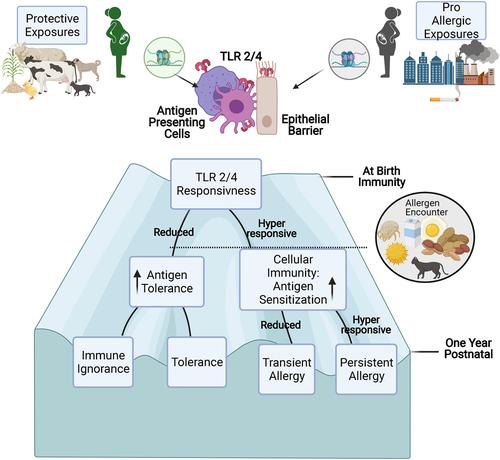当前位置:
X-MOL 学术
›
Ann. N. Y. Acad. Sci.
›
论文详情
Our official English website, www.x-mol.net, welcomes your
feedback! (Note: you will need to create a separate account there.)
Role of innate immunity and myeloid cells in susceptibility to allergic disease
Annals of the New York Academy of Sciences ( IF 4.1 ) Pub Date : 2021-06-22 , DOI: 10.1111/nyas.14654 Justine C Noel 1 , M Cecilia Berin 1
Annals of the New York Academy of Sciences ( IF 4.1 ) Pub Date : 2021-06-22 , DOI: 10.1111/nyas.14654 Justine C Noel 1 , M Cecilia Berin 1
Affiliation

|
Allergic diseases, including asthma, food allergy, eczema, and allergic rhinitis, are common diseases increasing in prevalence. Allergy, a failure of immune tolerance to innocuous environmental allergens, is characterized by allergen-specific immune responses, including IgE antibodies and T helper and T follicular helper cells producing type 2 cytokines. Despite the central role of adaptive immunity in pathophysiology of allergy, there is a growing body of evidence indicating an important role for the innate immune system in allergic disease. In this review, we focus on epithelial–mononuclear phagocyte communication in the control of allergy and tolerance. We discuss studies on early life environmental exposures and allergy susceptibility, and the evidence for innate training of mononuclear phagocytes as the mechanistic link between exposure and health or disease.
中文翻译:

先天免疫和骨髓细胞在过敏性疾病易感性中的作用
过敏性疾病,包括哮喘、食物过敏、湿疹和过敏性鼻炎,是患病率不断增加的常见疾病。过敏是对无害环境过敏原的免疫耐受失败,其特征是过敏原特异性免疫反应,包括 IgE 抗体和 T 辅助细胞和 T 滤泡辅助细胞产生 2 型细胞因子。尽管适应性免疫在过敏的病理生理学中起核心作用,但越来越多的证据表明先天免疫系统在过敏性疾病中的重要作用。在这篇综述中,我们关注控制过敏和耐受的上皮-单核吞噬细胞通讯。我们讨论关于生命早期环境暴露和过敏易感性的研究,
更新日期:2021-06-22
中文翻译:

先天免疫和骨髓细胞在过敏性疾病易感性中的作用
过敏性疾病,包括哮喘、食物过敏、湿疹和过敏性鼻炎,是患病率不断增加的常见疾病。过敏是对无害环境过敏原的免疫耐受失败,其特征是过敏原特异性免疫反应,包括 IgE 抗体和 T 辅助细胞和 T 滤泡辅助细胞产生 2 型细胞因子。尽管适应性免疫在过敏的病理生理学中起核心作用,但越来越多的证据表明先天免疫系统在过敏性疾病中的重要作用。在这篇综述中,我们关注控制过敏和耐受的上皮-单核吞噬细胞通讯。我们讨论关于生命早期环境暴露和过敏易感性的研究,











































 京公网安备 11010802027423号
京公网安备 11010802027423号